The Lady Dared—Deborah Kerr
It was nine Thanksgivings ago that I first met Deborah Kerr, and ever since I’ve been thankful for a friendship that has grown deeper with each passing year.
It isn’t easy to have a close relationship with a film star. In the first place, “to have a friend, one must be one,” and most actresses are too preoccupied with themselves to devote the time and effort necessary in any “give-and-take” relationship. Then, too, most actresses-—aware of the hangers-on, who breed off success—are suspicious of new faces. They’re also too single-minded in the pursuit of a career, to allow anyone not connected with their work to intrude in their private world.
But Deborah isn’t like most actresses. She’s that rare person, who in all phases of her life—marriage, motherhood, career and friendships—is successful and contented.
AUDIO BOOK
She doesn’t give the impression of being a glamour queen. She has had only one husband, Anthony Bartley, and she has been happily married to him for eleven years. She has lived in the same house, with the same household staff, since she arrived in Hollywood, nine years ago. She has never rated a glance from a scandal magazine for one good reason—there is no skeleton in her closet. She has never gone on a press junket, attended a film festival, or prompted publicity for herself via mad hats, Bikini bathing suits and tight-fitting sweaters. She has had many disappointments and setbacks in her climb to the envious pinnacle she has achieved, but she has never wasted a moment in regret. Marilyn Monroe, Anita Ekberg and Jayne Mansfield get more fan mail than Deborah does, but she’s won 13 awards as “best actress” on both the stage and screen. Although Paulette Goddard and Sonja Henie have more fabulous jewels, Deborah has two that no money can buy—her nine-year-old daughter, Melanie Jane, and her six-year-old, Francesca Anne. Her friends aren’t confined to the motion picture colony in Hollywood, the Sardi set in New York, or the Caprice crowd in London. In Palm Beach last Christmas, she, Tony and the children occupied the Tony Pulitzer guest house. In Detroit, the Henry Fords entertained for them. In England, they were week-end guests of Nancy and Lord Astor at Cliveden. Lord Beaverbrook’s granddaughter, Lady Jane Campbell, is Tony’s godchild. His father is Sir Charles Bertley. But neither Tony nor Deborah are social snobs.
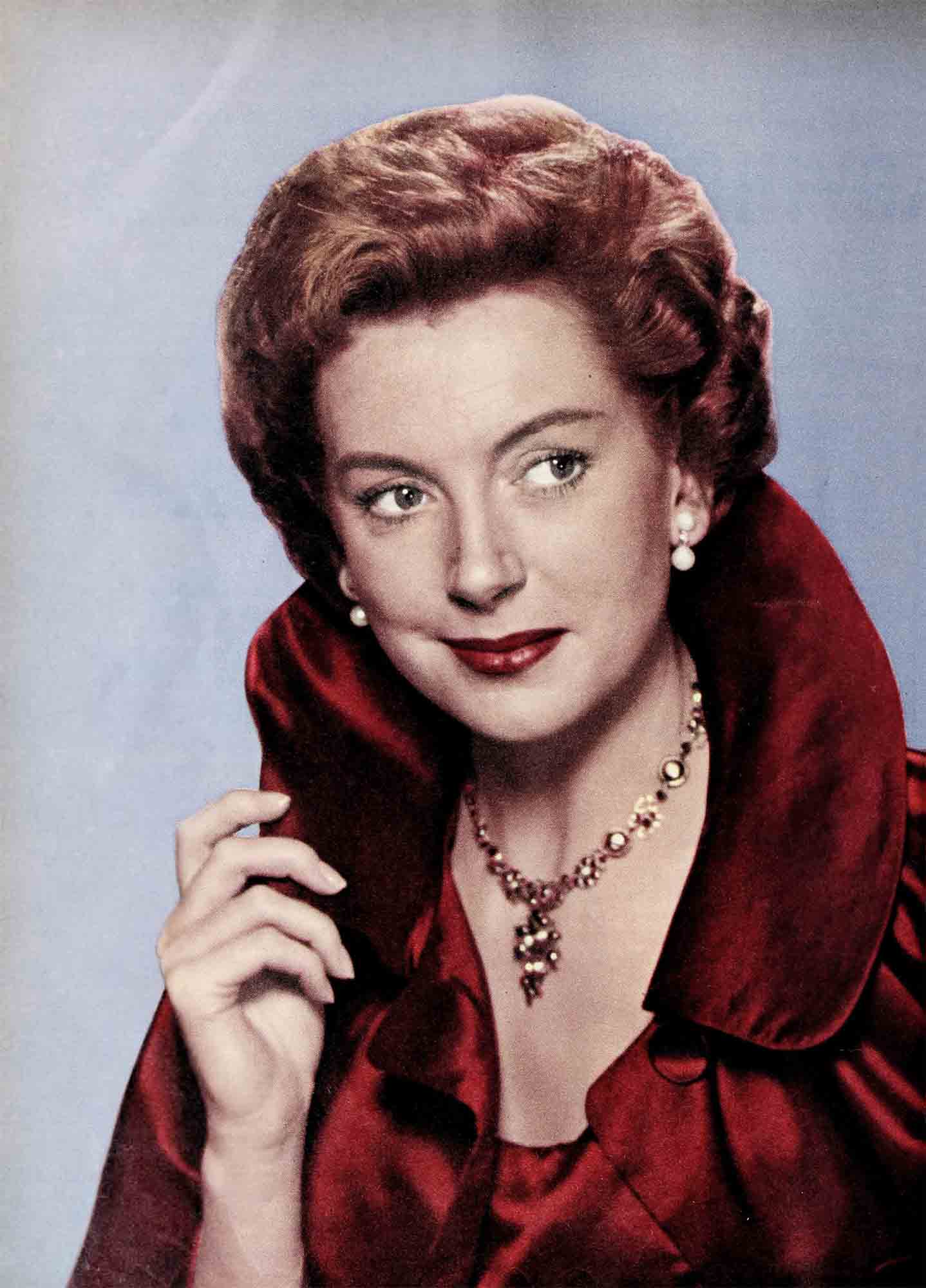
Deborah’s first paycheck was ten shillings. Today, she is one of the top-salaried stars in Hollywood and on Broadway. But she has never been blase about worldly goods. On her last birthday, Tony gifted her with a Van Cleef and Arpels gold compact, and she was so excited, you would have thought it was the Hope diamond! Women trust her, men admire her, and no one envies her her success, because Deborah has earned it—by a dedication to whatever job she undertakes; by never stepping on anyone in her own climb up the ladder; by being a born trouper; by having the lasting trademark of every great star . . . talent.
It is this talent that has won for her in the past year three roles that only an actress of her versatility could portray—Mrs. Anna in her first musical, 20th’s “The King and I”; a Red Cross nurse in Paramount’s “The Proud and Profane”; and the wife of an English professor in a boys’ prep school in M-G-M’s “Tea and Sympathy.” This last part she created on the Broadway stage and for it she earned the most prized awards in the theatre—the Donaldson Award, the Variety Drama Critics Poll, and the Sarah Siddons Award.
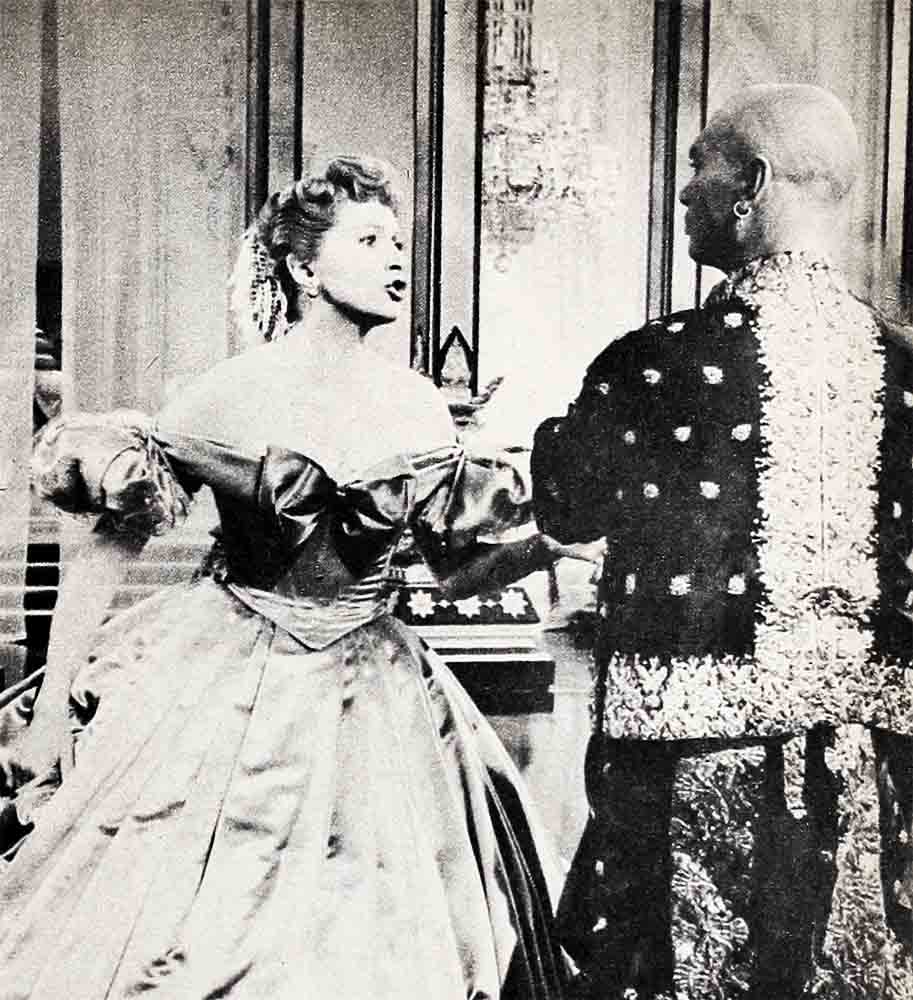
Deborah (no one who really knows her intimately ever calls her Debbie) has a philosophy of life which has guided her through the rough shoals of a career that hasn’t been as smooth-sailing as it is now. “I believe that life is a pendulum,” she says, “and that everything goes along for a period of time in one cycle and then changes to another phase. This happens to many people. And at the time you are in a certain cycle you may not quite realize that a whole series of events has followed through in the same vein. Then, when the cycle changes, you can look back and see that a certain phase has completed itself. For a two-year period now, I have been in a wonderful cycle. I’m indeed fortunate that the pendulum is swinging favorably in my direction now, and I’m thoroughly enjoying the wonderful things that are coming my way.”
I have known Deborah during most of these cycles, ever since she first sailed into New York harbor, in November of 1947. That there is a “destiny that shapes our lives” was proven the very night of her arrival. A mutual friend, who had crossed on the Queen Elizabeth with the Bartleys, called me and suggested that we make up a party of four and help entertain these “bundles from Britain” on their one night in town, before they took off for Hollywood. I invited them to join me at the Waldorf to hear a singer, who had skyrocketed to fantastic heights. Would Deborah and Tony like to hear Frank Sinatra, too? They would adore it, since they were great fans of his, having heard his records in England, and it would be such a thrill to see him now “in person.” So, off we went to the Empire Room, and as Frankie crooned his love songs to the elite of Park Avenue and Deborah decorated the ringside with her delicate beauty, little did either of them dream that seven years later they would meet again in “From Here to Eternity,” the picture that was to change the whole future of both their careers!
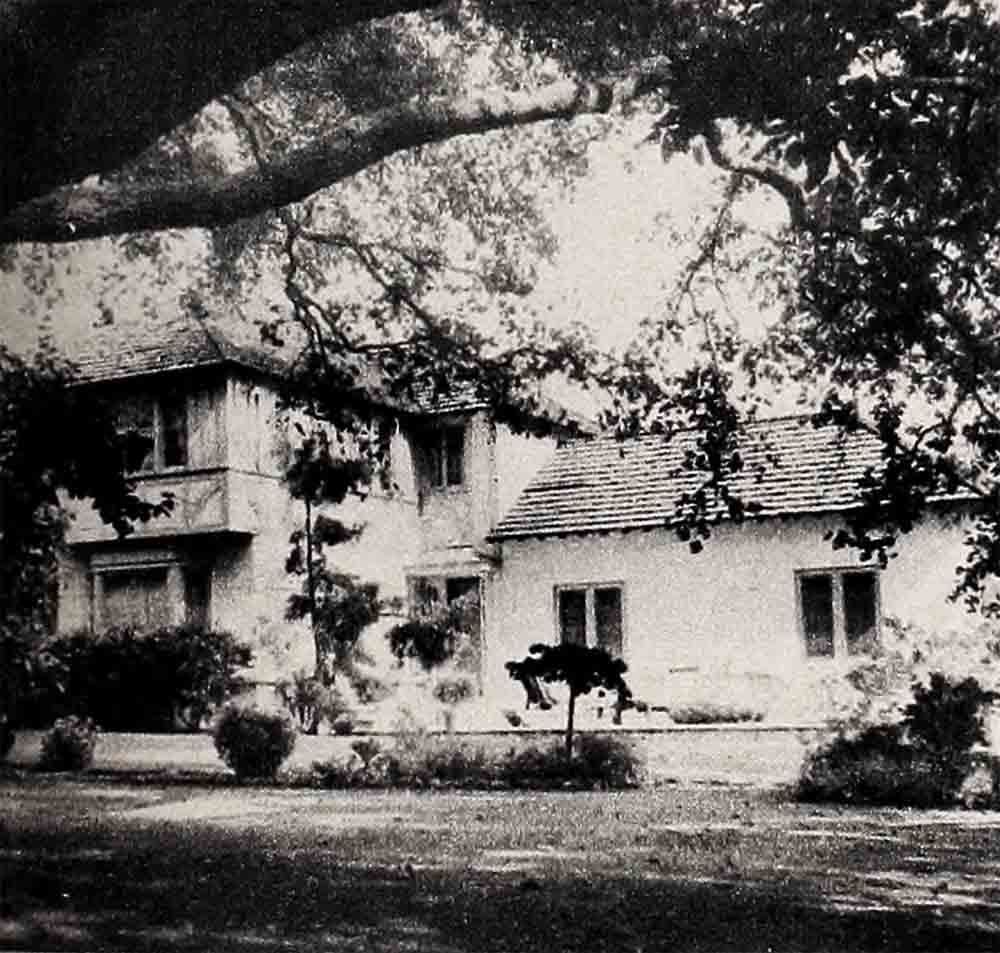
That was the first cycle. Cycle Number Two came in Hollywood, several months later. Catching up with Deborah and Tony again in their Pacific Palisades home was like catching up with life-long friends, a feeling I have never lost, no matter how long the absences between our reunions. Outwardly, I noted a few changes in Deborah. Her flowing red hair that she had worn shoulder-length was now a short bob. She had put on some excess poundage, ordinarily fatal to a film star, but a delight to Deborah. She was expecting the first Bartley heir, who turned out to be an enchanting daughter, Melanie Jane. Deborah’s peaches-and- cream complexion, which seems to be the reward for English dampness, hadn’t been ruined by the hot California sun (principally because she never sits in it without a big hat to protect her delicate skin). But from within, she radiated the same natural charm and modesty that had endeared her to me in New York.
“Is Hollywood anything like you imagined it would be?” I asked as we lingered over the dinner table.
“Yes and no,” was Deborah’s reply. “It’s as fabulous as we expected. The luxury of living, especially all those divine, modern conveniences like refrigerators, washing machines and every electrical gadget, are like magic toys to us Britishers. And the supermarkets, bulging with all sorts of food, are unbelievable, after our strict rationing all through the war years. Another great difference between Hollywood and England is that people over here are so very much more friendly to strangers. It is wonderful and bewildering at the same time. For instance, we are always getting invitations to parties from hosts and hostesses that we have never even met, and we are warned if we don’t accept, we will be considered high- hat. In London, a man’s home is his castle, and he only invites those into it whom he considers close friends. I’ve also been told that, as a newcomer to Hollywood, I should be seen in public restaurants like Romanoff’s, Chasen’s and The Macombo, because it will get me into the columns—which would be helpful to my career. Tony and I love our home, so it seems silly to dash out to a crowded restaurant when we can dine in the comfort of our own fireside, with chums like Dinah Shore and George Montgomery, who have become our greatest pals here. And, then, there’s one more ‘pearl of wisdom’ I’ve been given from my Hollywood advisers. When word slipped out that we were ‘blessed eventing,’ as you so quaintly put it over here, I was quickly admonished not to tell Louella before Hedda, and vice versa. Back home, when you’re expecting a visit from the stork, you confide in your parents and most intimate friends, but you wouldn’t dream of calling a columnist. Over here, it seems the definition of a modern parent is ‘someone who knows she is having a baby before Walter Winchell does!’ Frankly, we’re so bewildered by all this advice, we don’t know what to do. Do you think that following this accepted Hollywood behavior pattern really helps a career?”

“Frankly,” I replied, “I think you can go to every Hollywood party, be seen in every Hollywood restaurant, give every columnist an exclusive story and, in the final analysis, the only thing that matters is what’s up there on the screen!”
“Bless you for saying that!” Deborah exclaimed. “That confirms exactly how Tony and I have both felt all along.”
Unfortunately for Deborah’s cycle during the next few years, “what’s up there on the screen”—with the exception of “Edward My Son” which won her an Academy Award nomination—didn’t matter very much. In British films, Deborah had had an impressive record of out-standing pictures, and it was on the strength of this that Metro-Goldwyn-Mayer persuaded the late Gabriel Pascal, who had Deborah under personal contract to part with her for the “persuasive” sum of $250,000! Amazingly enough, once she arrived in Hollywood, Metro didn’t seem to realize what valuable property they had acquired. They put Deborah in namby-pamby colorless roles that gave her no opportunity to showcase her superb dramatic talent. For some inexplicable reason, the fact that she was a “lady” was supposed to rob her of any sex appeal. This, of course, was in the pre-Grace Kelly days! And so, while the Marilyn Monroe type of sextacular appeal was being given the build-up, Deborah was relegated to costume spectaculars like “Prisoner of Zenda,” “Quo Vadis and “Julius Caesar.”
Naturally, she felt frustrated and stultified, but she never complained or became embittered. “I’m just a cockeyed optimist so I felt if I were patient enough, the cycle was bound to change!” Deborah once told me, in recalling those dark days. It was during this period that Deborah and Tony flew back to London to show off their daughter Melanie to her doting grandparents and relatives. Deborah will always be grateful that she made this visit when she did. The following year her beloved mother, who had come unscathed through the blitz all during the terrifying war years, was tragically killed in a motor accident.

On this trans-Atlantic crossing, Deborah didn’t have Melanie’s English “Nanny” along. She wanted to take advantage of this Summer Sabbatical to give Melanie her undivided attention. Deborah doesn’t play at being Mother when the mood suits her, it’s her favorite role. I’ve seen her turn down invitations to the most spectacular social gatherings, to stay home and baby-sit. When she was the toast of Broadway, in “Tea and Sympathy,” two seasons ago, she could never be lured to a cocktail party, because she had early dinner every night with the children, followed by a reading session or record playing. Melanie, who looks like Deborah is a pixie and a born ham. It is safe to predict that she will not only act, but will write her own roles, too. Her flights of imagination are staggering in one so young! Francesca, who is nicknamed “Frankie,” bears an amazing resemblance to her father; she’s almost a miniature replica of Tony. Unlike many children of Hollywood parents, Melanie and Frankie have had the advantage of security. Not the security that comes with marble estates, emerald swimming pools, and chauffeured cars, but the security of deep-rooted and permanent affection, They have only had one set of parents and have never heard an angry word exchanged between them. They have lived in the same house since they were born have had the same “Nanny” to take care of them. They breathe an atmosphere that exudes serene and gracious living. They know that their mother is an actress and when they go out with her people stare, and sometimes take their pictures, but they accept this with the same matter-of-factness they accept their father’s job as a CBS executive.
Deborah, unlike some Hollywood film mothers, has no objections if her children want to follow in her footsteps. “If that’s what they want to do, why not? Only I’ll give them the same advice I give to all aspiring actresses: Be terribly honest with yourself and find out from someone whose opinion you respect whether you have anything worth developing for the stage or screen. If you have, don’t hang around waiting for a job, but do anything to exercise that talent, so that when the breaks come, you’ll be prepared. Finding yourself on top without that equipment will pull you down the ladder faster than you got up there. The days have ended when the Lana Turners were discovered at a soda fountain and just a pretty face and figure got you a contract. The stars of tomorrow are hard-working, earnest youngsters, like Susan Strasberg, John Kerr, Don Dubbins, and Tony Perkins!” At the mention of the last three actors, Deborah’s blue eyes danced in excitement, “All three of them played with me in ‘Tea and Sympathy.’ And now John has recreated his role in the film version, Tony has a contract with Paramount, and Don with Metro.”
After her triumphant success in “From Here to Eternity,” Deborah could have written her own ticket at any studio. But during the shooting, she had read the play script of “Tea and Sympathy.” She knew that leaving Hollywood when she was such a hot property and gamble on the vagaries of Broadway might be a terrific risk. On the other hand, it might prove a very strategic move. She decided to take the gamble. Her good luck cycle was still with her: All nine of the first-string New York drama critics embraced her as their newest Valentine.
I’ll never forget Deborah’s playing in “Tea and Sympathy.” I was at the opening night in New York and the closing night in Los Angeles. And in between, while Deborah was emoting at the Ethel Barrymore Theatre, her husband Tony and I would go see another show, then pick her up later, for a full report over late supper. We always arrived just in time to stand in back of the theatre and watch the final, climactic scene, and the audience reaction was always the same. You could hear a pin drop in those agonizingly tender moments, and then as the curtain fell, the applause would break like a thunderstorm. Afterward, in her dressing room, there was always a parade of backstage visitors. One evening after Claire Trevor, Esther Williams, Charles Laughton and Claudette Colbert had left, Deborah laughingly exclaimed, “I’ve seen more people from Hollywood in my dressing room than in all the years I lived there!
It is a human frailty that most stage actresses pray for success and then get bored to death if they have a long run. They also hate to tour. But again, Deborah is an exception. She played “Tea and Sympathy” for a whole season on Broadway and then toured with it for another season. It was an exhausting part, and some nights she didn’t think she would have the strength to go on, but she always did and never once let down her audience or the rest of the company by giving an indifferent performance, Everyone adored her, from the ushers out front, to the backstage crew, to the entire cast. I know because I saw it with my own eyes at a Sunday brunch that Deborah hosted for the whole gang during their L.A. engagement. The only “outsiders” invited were Jean Simmons and myself. On the closing night at the Biltmore Theatre, the company manager made a speech to the audience—the first time a thing like this had ever happened in the history of the theatre. He said that in all his veteran years, he had never known any star so untemperamental, unspoiled and unaffected as Deborah. Then, on behalf of the company, he presented her with a silver frame inscribed: “D.K. First Lady of the Theatre. May you always remain supreme. With love from the ‘Tea and Sympathy’ Company.” It is one of Deborah’s most prized possessions along with her Degas print, given her by director Elia Kazan; her Durer engraving, a gift from John Kerr; and the pen and ink portrait of her as Laura in “Tea and Sympathy,” sketched by Bill Holden.
Rarely does a star who has created a role on the stage get the chance to recreate it on the screen. Usually, the Front Office gives the command, “Get someone like Nancy Kelly or Deborah Kerr.” But since, nowadays, “what Deborah wants, Deborah gets,” she inherited the same role for the film version, along with John Kerr and Lief Ericson of the original cast.
Before reporting for “Tea and Sympathy,” Deborah came to New York for a shopping whirl, and over a luncheon gabfest, we caught up where we had left off in Hollywood last summer, just before she’d left on location to the Virgin Islands for “The Proud and Profane.”
“Join the movies and see the world, that’s me!” said Deborah. “But I don’t recommend San Juan in the summer. It’s exotic and colorful, but humid and mosquito-ridden. The kids, Bill Holden’s and mine, had a ball, though. They went sailing every day while we slaved in the midday sun. But everything has its compensations. I think it’s a fine picture, and it brought Bill and Ardis Holden into our lives. We number them among our closest friends now. I’ve also fallen in love since you last saw me.”
In answer to my startled look, Deborah hastened to explain, “with ‘The King and I.’ Funny, when I saw ‘The King and I’ in London several years ago, I never dreamed that I would someday play Mrs. Anna on the screen. What an absolutely heavenly part it is, so fairytale in its quality, yet so real—and so full of changing moods. I sing two of the numbers myself, ‘Getting to Know You’ and ‘Shall I Tell You What I Think of You?’ The rest of the Rodgers and Hammerstein score is beyond my vocal range now, so I just start them and when it comes to the high notes, Marni Nixon, a glorious singer, takes over. But the dubbing is so perfect, I’ve almost convinced myself that I sing all the numbers. Actually, I never worked so hard on any picture or enjoyed myself so much. I hope to do another musical one of these days, but I’m afraid I’m spoiled. Mrs. Anna, to me, is what Scarlett O’Hara was to Vivien Leigh. Where can I ever find another role to equal it?”
“In the right cycle,” was my reply. “Remember?”
Deborah laughed. “You’re so right! For the present, I’m not looking for anything except a long summer holiday in London with Tony and the children. As you know, Tony’s new job keeps him in London most of the year. Of course, every time we separate, the rumors start flying that we are getting divorced. At first, it used to upset me, because in England, where military or marine service is so customary, a British wife adjusts herself to separations, with no fuss or gossip from the local busybodies. Tony’s career and success is vital to his happiness and mine. He knew when we were married that acting was to be part of the life that he would share with me, and he wouldn’t dream of asking me to give it up. Nor would I expect him to sacrifice any opportunity to further his career no matter where it took him, because I was only concerned with my own loneliness or malicious rumors. If there’s a mutual trust in any marital relationship, it will survive. If there isn’t, it is destined for an unhappy ending. Happiness isn’t a question of geography; it’s what people bring to it anywhere. We have attained it wherever we happen to be at the time. Maybe it’s because we’re lucky enough to be two well-adjusted people. So, thank goodness, are Melanie and Frankie.”
“But if you had to narrow your choice down to one spot,” I asked, “where would you most prefer to live?”
“Hollywood, I guess, because it’s easier to maintain a happier family life while making pictures than on the stage. When I’m filming, I get an occasional day off to spend at home, and now with the new five-day week schedule, it’s so wonderful to have long weekends with the children, at the beach or Palm Springs, or just lazying at home together around the pool. I adore our house, and it never looked so good to me as when I came back to it after living out of trunks, sleeping in strange beds, all during the road tour of ‘Tea and Sympathy.’ ”
To me, their house which is a home, is the loveliest of all the stars’ homes I have visited in Hollywood. Located in Pacific Palisades, on a high bluff, it looks like a villa on the Mediterranean, with its Spanish tile roof and its breathtaking three-sided view of the Pacific. The living room and loggia are decorated in lime green, cocoa and white. The sitting room is in pearl gray, yellow and gold. Deborah’s bedroom is in Wedgewood blue and white, with white sofas, accented with coral and turquoise pillows. The whole sprawling house reflects Deborah’s and Tony’s own sunny warmth.
Deborah doesn’t have much time for hobbies, but she has managed to collect a priceless assortment of antique china during her travels—teacups and pots in Worcester, Lowestoff, Dresden, Sevres; a complete Ironstone miniature tea set; and one of the rare and prized Crown Derby, among the 200 sets made for Queen Elizabeth’s Coronation.
And although she, herself, is as fragile as this china, Deborah is unbreakable in determination, courage, integrity and all the lasting things of life. These qualities have brought her to the present pinnacle of her career, and the pendulum will continue to swing in the future, to bless her with continued success and happiness. Next March, when she romps off with an Academy Award, remember you read it here jirst!
THE END
It is a quote. PHOTOPLAY MAGAZINE AUGUST 1956
AUDIO BOOK


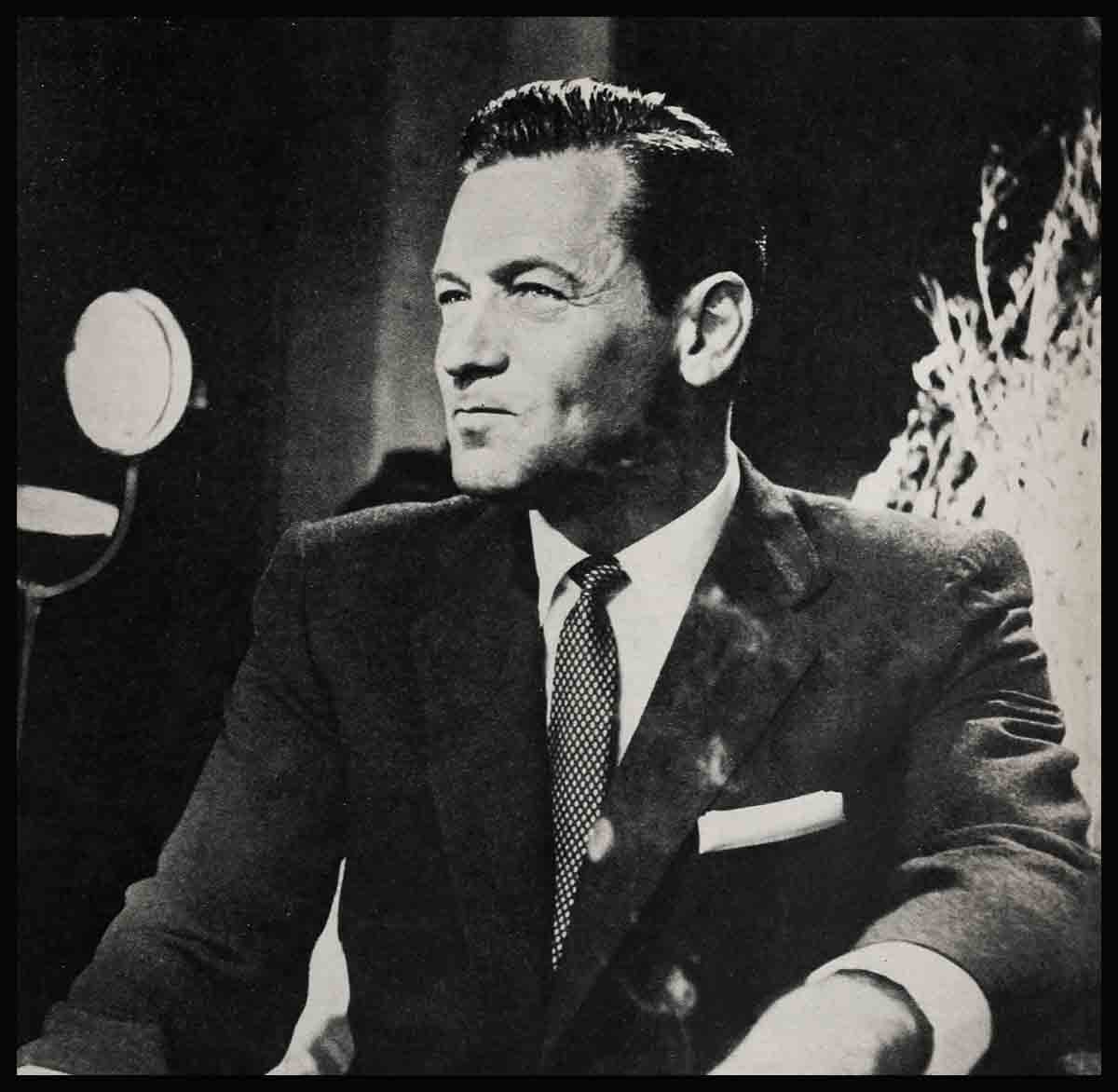

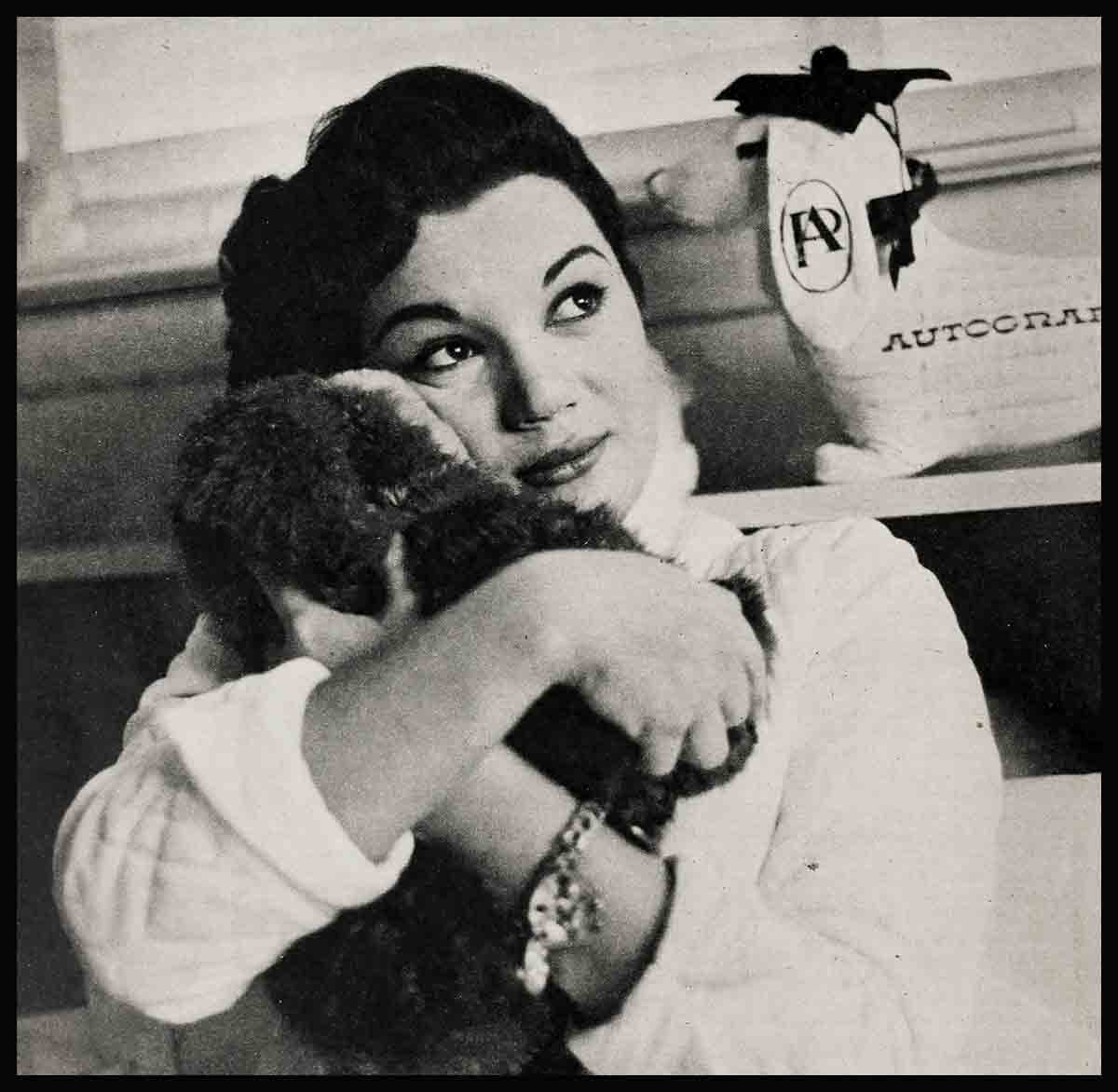
No Comments